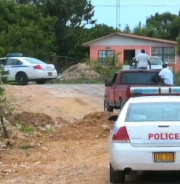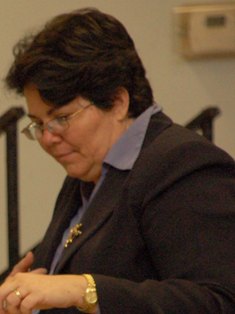Archive for June 30th, 2010

Unemployed construction workers close down site
 (CNS): Police have confirmed that they attended a dispute at a construction site in East End yesterday. New27 reported that the dispute was between out of work construction workers in East End and a contract company which claims there was vandalism at the site and one of its staff was assaulted. Billy McLaughlin, owner of East End Labours, said the group of unemployed workers decided to close the job site down. He told the television company, “A lot of people might not agree with me, but it is time, and the time has come, and we’re taking control.” (Photo courtesy News27)
(CNS): Police have confirmed that they attended a dispute at a construction site in East End yesterday. New27 reported that the dispute was between out of work construction workers in East End and a contract company which claims there was vandalism at the site and one of its staff was assaulted. Billy McLaughlin, owner of East End Labours, said the group of unemployed workers decided to close the job site down. He told the television company, “A lot of people might not agree with me, but it is time, and the time has come, and we’re taking control.” (Photo courtesy News27)

Year 12 offers bridge to future
 (CNS): What we think of as “success” should not be limited to achievement in academic studies but should be looked at as students leaving school and being able to move on and take their place in the adult world, according to Chief Education Officer Shirley Wahler (left). Therefore, with the restructuring of secondary education on Grand Cayman, Year 12 students are now offered a range of vocational studies, as well as the opportunity to re-sit CXC and GCSE external exams or take advanced academic courses. This restructuring was achieved without additional funding, with less staff and without the new schools that were part of the original plan, Wahler noted.
(CNS): What we think of as “success” should not be limited to achievement in academic studies but should be looked at as students leaving school and being able to move on and take their place in the adult world, according to Chief Education Officer Shirley Wahler (left). Therefore, with the restructuring of secondary education on Grand Cayman, Year 12 students are now offered a range of vocational studies, as well as the opportunity to re-sit CXC and GCSE external exams or take advanced academic courses. This restructuring was achieved without additional funding, with less staff and without the new schools that were part of the original plan, Wahler noted.
Starting in September, Year 12 students on Grand Cayman will be the first year group to have the advantage of the restructured final high school year. However, this has not yet been introduced on Cayman Brac and the education ministry will now embark on a consultation exercise to gauge whether the Cayman Brac community wants the same framework for students there.
Speaking to parents and teachers at a recent PTA presentation at the Cayman Brac High School, Wahler explained that in the early 1990’s students were not leaving school with good exam results and many were leaving school at 15½ to 16½, which was thought to be too young. After much national discussion, the government dropped A’ levels from public school and added a year of secondary education so that external exams were taken after three years of study instead of a two year course. In Britain and everywhere else in the Caribbean where the British system is used the exams are taken after two years, she noted.
However, instead of better results, exam results actually fell – they dropped for a few years then plateaued, then stayed low, Wahler said. While the reasons for this are not clear, she said that for students who are not academic those three years can be really frustrating and they still achieve little success at high school, whereas students who do well in exams do just as well in two years as three.
This year on Grand Cayman 720 students — all of year 11 and Year 12 — took their external exams, and the Year 11 students will remain at school for the compulsory Year 12 at the George Hick campus, the culmination of a process that began under the previous PPM administration.
The new Year 12 provides a safety net for students who achieve poor results (typically D/IV grades), since they now have a second chance to take CXC or GCSE exams. For high achievers who gain at least five higher passes including English and Mathematics, the Department of Education Services (DoES) has introduced the Advanced Placement International Diploma (AP), which offers a bridge to university.
Curriculum Development Officer Clive Baker explained that the courses students have been taking at high school up until now are not designed as college preparation courses. “We have been setting up a large number of kids for failure. We send them overseas and in many cases they struggle academically, particularly with mathematics. CXE does not prepare them, by any stretch of the imagination, for college algebra. So they get disillusioned and often don’t go back to college and their confidence is broken,” he said.
Success in the AP programme can give students credit at college, which could in some cases be as much as a year credit, Wahler explained. “It’s a fantastic programme, but it’s very intense and not for everyone,” she said.
As an alternative to the Year 12 programme, students can take A levels at a private school that offers these or go to UCCI to continue their education, but they will not get an overseas scholarship straight after Year 11 and they will have to show that they have attended and gained suitable achievements in their chosen alternative education path to do so.
However, the CEO said that we must rethink how we regard “success”, which is not limited to the traditional definition of achievement in academic studies but should be looked at as students leaving school and being able to move on and take their place in the adult world. The school system can’t be mother and father to those students who don’t have the advantage of good parenting, Wahler said. “But maybe we can show them a better way. We can’t save every child but it is our responsibility to save as many as we can.”
The Year 12, therefore, now has a strong vocational studies element, which will give students externally accredited qualifications in vocational, career and technical (VoCaT) education in the Further Education Programme.
This will be offered at two levels: Level 2 VoCaT education programmes are aimed at students who have at least 3 or 4 passes at grades D/IV or below. Students will take BTEC First Diploma schemes (equal 2 –4 GCSE passes), which has a work experience component (at least 1 day per week). It is also possible to combine vocational courses with some re-sits. Level 1 VoCaT basic technical skills programmes are for students who have had limited academic success. The focus is on ensuring basic literacy, numeracy, ICT skills, and there is a strong work experience component.
On Cayman Brac it is possible to restructure the high school so that next term’s Year 9 are able to take advantage of the “5+1” system. These students will then choose their options at the end of the next academic year and take their external exams at the end of year 11.
For more on the restructured secondary education, visit the Department of Education Services blog.
RCIPS swells pool of underwater cops
(CNS): With the addition of eight officers to the number of law enforcement officials that can now work underwater the RCIPS now has a dozen divers available for duty. The officers were trained by Customs Officer Darren Kirchman, who is a member of the Joint Marine Unit (JMU), The officers who successfully completed the PADI open and advanced water courses will now form a ‘pool’ of divers who can be called upon to assist the full time members of the JMU as, and when, operational demands dictate the police said.
Unrealistic projections behind failures says survey
(CNS): A survey of lenders in the Caribbean revealed that tourism development projects that have either stalled or failed in the region did so because of unrealistic projections or forecasting. The “Caribbean Regional Financing Survey” by KPMG’s regional advisory practice also pointed to lack of cash and poor financial management. As a result the lenders surveyed said the key lessons they had learned would see a back to basics, conservative, long- term approach to lending in the region. The accountants also found that failed or half-built projects will continue to find it very hard to refinance.
KPMG stated that recovery in the major tourism and investment markets will take time to translate into recovery in the region. “The development pipelines will be fairly slow for the next two to three years and the roller coaster ride in personal savings and investments over the last few years could further dampen the demand for second homes even longer; the exception being very high net worth individuals,” it said in a release about the survey.

Alex becomes season’s first hurricane
 (CNS): Following its organisation Alex has become the first hurricane of the 2010 season and the first June Atlantic hurricane since 1995. At 10:00 pm on Tuesday night Hurricane Alex was a category one hurricane moving mostly westward near 9 mph approaching the coast of north eastern Mexico or Southern Texas. Maximum sustained winds had increased to near 75 mph with higher gusts and the NHC was predicting additional strengthening prior to landfall. Hurricane force winds extend outward up to 15 miles from the centre and tropical storm force winds extend outward up to 175 miles.
(CNS): Following its organisation Alex has become the first hurricane of the 2010 season and the first June Atlantic hurricane since 1995. At 10:00 pm on Tuesday night Hurricane Alex was a category one hurricane moving mostly westward near 9 mph approaching the coast of north eastern Mexico or Southern Texas. Maximum sustained winds had increased to near 75 mph with higher gusts and the NHC was predicting additional strengthening prior to landfall. Hurricane force winds extend outward up to 15 miles from the centre and tropical storm force winds extend outward up to 175 miles.

PPM questions new honours
 (CNS): The opposition said the new national honour system is at risk of being politicised because of the power the premier’s office wields over the committee and the decisions on who will receive the awards. The National Honours and Awards bill was presented to the Legislative Assembly on Monday when McKeeva Bush said it was part of the march towards nation building. He said it would not replace royal awards but would allow the country to honour its own. However, Alden McLaughlin, who said he backed the concept, pointed out that the law was written in such a way that it may give the appearance of being granted at the whim of the ruling party.
(CNS): The opposition said the new national honour system is at risk of being politicised because of the power the premier’s office wields over the committee and the decisions on who will receive the awards. The National Honours and Awards bill was presented to the Legislative Assembly on Monday when McKeeva Bush said it was part of the march towards nation building. He said it would not replace royal awards but would allow the country to honour its own. However, Alden McLaughlin, who said he backed the concept, pointed out that the law was written in such a way that it may give the appearance of being granted at the whim of the ruling party.

Sarkozy clamps down on French ministers’ perks
 (The Guardian): Spare a thought – and perhaps a euro – for the poor French politician. No more taxpayer-funded Cuban cigars, private jets, or even luxury hotels. And, if Nicolas Sarkozy has his way, no more overstaffed offices and unfettered use of the ministry photocopier. Having cancelled the Elysée palace summer garden party, the French president has decided everyone else must "make an effort" to tighten their professional belts. Anxious to be seen wielding the austerity axe following a spate of scandals over official perks, not to mention a ballooning public deficit, he is demanding ministers’ spending be "vigorously reduced".
(The Guardian): Spare a thought – and perhaps a euro – for the poor French politician. No more taxpayer-funded Cuban cigars, private jets, or even luxury hotels. And, if Nicolas Sarkozy has his way, no more overstaffed offices and unfettered use of the ministry photocopier. Having cancelled the Elysée palace summer garden party, the French president has decided everyone else must "make an effort" to tighten their professional belts. Anxious to be seen wielding the austerity axe following a spate of scandals over official perks, not to mention a ballooning public deficit, he is demanding ministers’ spending be "vigorously reduced".